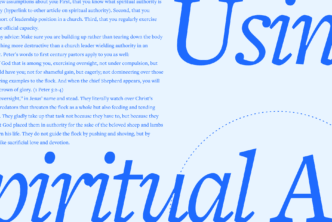In my early twenties, I traveled the world encouraging missionaries fulfilling the Great Commission. I witnessed the gospel reaching tribal groups and the Scriptures translated into new languages.
This is what I wanted to do with the rest of my life.
My husband and I planned to become international missionaries—to dedicate our lives to live out Jesus’ instructions to “Go, make disciples” (Matt 28:18).
But the Spirit said, “Stay.”
So I asked the necessary questions: What is the Great Commission, and is it for me? When God tells you to “stay,” does it change what we do?
Over the years, as I studied Scripture, I realized the Great Commission is not just for foreign missionaries. It’s for all disciples of Christ, wherever we live, and whatever our occupation.
What is the Great Commission?
What is known as the “Great Commission” is found in Matthew 28:18–20, in the last verses of the Gospel passage recording Jesus’ final instructions and encouragement.
Then Jesus came to them and said, “All authority in heaven and on earth has been given to me. Therefore go and make disciples of all nations, baptizing them in the name of the Father and of the Son and of the Holy Spirit, and teaching them to obey everything I have commanded you. And surely I am with you always, to the very end of the age.” (Matt 28:18–20 NIV)
To help us understand the Great Commission, we need to look at:
- The cultural context
- The gospel context
- The language
- The Great Commission in the big story of Scripture
- The Great Commission in the New Testament
- How do I live the Great Commission?
Cultural context
In Matthew’s day, “making disciples” was a term that described the relationship between rabbis (Jewish religious teachers) and their followers (disciples).
Rabbis made disciples by teaching them to obey Jewish law (the Torah). Most rabbis only taught Jews, not Gentiles (non-Jews), and none would have taught women in any official capacity.
Jesus came into a Jewish framework as a teacher (rabbi), but he welcomed any disciple who would follow him: uneducated fishermen (Matt 4:19), women from various walks of life (Luke 8:1–4), and even the religious elite (John 3:1–21).
Scriptural context
The Gospel of Matthew was written for a Jewish audience but was widely read by both Jews and non-Jews in the early church to demonstrate that Jesus was the long-awaited Messiah of Israel, who has brought salvation to all nations.
Matthew records that after Jesus rose from the grave and appeared to the women, he told them to tell the eleven disciples to go to the mountain in Galilee.
Jesus appeared to the eleven on the mountain in Galilee and gave the Great Commission.
The Great Commission Bible passage
To understand how to live out the Great Commission, we first need to understand what the original author intended for his audience.
We glean understanding by looking at the culture and context (above), and then the language of the passage.
We now will look at each part of the Great Commission passage.
Matthew 28:18
Then Jesus came to them and said, “All authority in heaven and on earth has been given to me.”
Jesus spoke to the eleven disciples by starting with declaring his authority. When he was on earth, he demonstrated his authority as the Son of Man (cf. Matt 9:6), but now he is declaring his authority as the One over all things, as prophesied in Daniel 7:13–14.
Because Jesus has authority over all things—he has authority to tell his followers what they need to do—and the power to help them do it.
Matthew 28:19
Therefore go and make disciples of all nations, baptizing them in the name of the Father and of the Son and of the Holy Spirit …
When Jesus instructed his disciples to baptize in the name of the Father, Son, and Holy Spirit, he was stating much more than a rote ritual. He was declaring himself as God and a part of the Trinitarian Godhead. For more on baptism, read here.
We make disciples of all people groups by going and baptizing and—
Matthew 28:20
… and teaching them to obey everything I have commanded you. And surely I am with you always, to the very end of the age.
Jesus’ teachings are the foundation of how we make disciples. What he said, and what he has done and will do, is our perpetual curriculum to teach believers.
God is with us to do his work.
When the Holy Spirit came on the Day of Pentecost and fell on both men and women disciples, it empowered all believers with the gift of the Spirit (Acts 2; John 14:16–18).
Now, when any believer repents (turns from their sin toward faith in Jesus) and is baptized, they receive the gift of the Holy Spirit (Acts 2:38).
Where it fits in the story of Scripture
The Great Commission is the fulfillment of God’s plan for humanity from the beginning.
In Genesis 1 before the Fall, Adam and Eve were commanded to fill the earth with God’s image-bearers (Gen 1:27–28). The Fall (Gen 3) brought sin into the world, and along with it, came death and all kinds of brokenness. It also fractured humanity’s ability to image God’s character, and to rule and care for the earth with God’s perfection because of our perpetual bent toward sin (Rom 6:23). However, God chose a man, Abraham, and promised that through him all the earth (nations/people groups) would be blessed (Gen 12:1–3). It is through Abraham’s line—through the son of promise, Isaac, and the nation of Israel—that Jesus eventually would be born (Matt 1).
Now, all who turn to Christ can live out the purpose of humanity: to fill the earth with God’s image by making disciples, who make disciples (Matt 28:18–20).
In Revelation, we see the Great Commission fulfilled.
After this I looked, and behold, a great multitude that no one could number, from every nation, from all tribes and peoples and languages, standing before the throne and before the Lamb, clothed in white robes, with palm branches in their hands, and crying out with a loud voice, “Salvation belongs to our God who sits on the throne, and to the Lamb!” (Rev 7:9–10)
What a glorious sight it will be for all nations to worship before the throne of God!
The Great Commission in the New Testament
Not only do we see the teachings of the Great Commission in the Old Testament, we also see it in other forms in three other Gospels in addition to Matthew—and in the book of Acts at the birth of the church. Here are some examples.
Luke 24:46–49 (NIV)
[Jesus] told them, “This is what is written: The Messiah will suffer and rise from the dead on the third day, and repentance for the forgiveness of sins will be preached in his name to all nations, beginning at Jerusalem. You are witnesses of these things. I am going to send you what my Father has promised; but stay in the city until you have been clothed with power from on high.”John 20:21 (NIV)
Again Jesus said, “Peace be with you! As the Father has sent me, I am sending you.”
Mark 16:15–16 (NIV)
[Jesus] said to them, “Go into all the world and preach the gospel to all creation. Whoever believes and is baptized will be saved, but whoever does not believe will be condemned.”Acts 1:8 (NIV)
[Jesus said,] “But you will receive power when the Holy Spirit comes on you; and you will be my witnesses in Jerusalem, and in all Judea and Samaria, and to the ends of the earth.”How do I live it out?
Through the ministry of the eleven disciples and the men and women of the early church (Acts 2), we have received the heritage of the faith to “Go, make disciples,” like the Great Commission declares.
But how can I make disciples? Where? When?
Consider the suggestions below.
1. Follow the Great Commission for yourself
Do you believe in Jesus Christ? Have you been baptized? Do you know and follow the teachings of Christ?
2. Make disciples
Follow the leading of the Spirit through prayer. Who can you influence who does not know Christ? Who can you invite to place their faith in Christ? Who can you teach to obey Jesus’ commands?
3. Go wherever the Lord calls you for the sake of making disciples
This might be to move to another place—or it might be to simply move out of your comfort zone to invite your neighbor to Christ.
4. Support missionaries who leave their homeland in order to make disciples in other nations
The Great Commission means living in obedience to the Spirit of God as I go grocery shopping, pick up kids from school—and work from home. All of life is mission when we live out Jesus’ commands to “Go, make disciples.”
How might the Spirit be leading you to “Go, make disciples”?
Related articles






